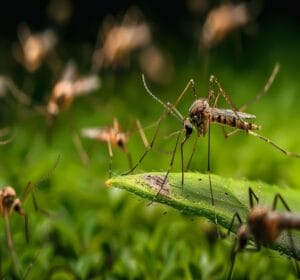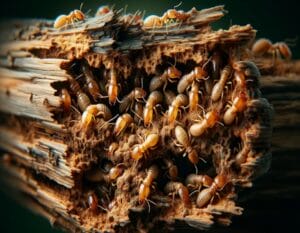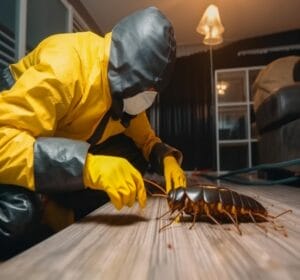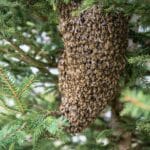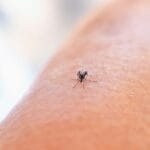Spring is the season of renewal, but it’s also prime time for pests to start eyeing your home for their next residence. As we shake off the winter chill, various critters are waking up with a hunger for warmth, food, and shelter—your shelter. But don’t worry, I’ve got your back. With some know-how and elbow grease, you can fortify your home against these uninvited guests. Here’s how to keep your living space pest-free this spring.
Key Takeaways
- Identify common spring pests such as ants, termites, mosquitoes, and spiders.
- Seal up entry points including windows, doors, and foundation cracks.
- Keep your pantry organized and food in sealed containers to deter pests.
- Maintain your yard to prevent pests from breeding and entering your home.
- Consider professional pest control services for serious infestations.
Your Springtime Battle Plan Against Pests
As the temperatures rise, so does the activity of pests. They’re not just annoying—they can cause real damage and pose health risks. But with a solid battle plan, you can prevent these critters from turning your home into their playground.
Seasonal Shifts Bring New Houseguests
Spring brings warmth and life, and not just to your garden. Pests such as ants, rodents, and termites become more active and may try to invade your home. They’re looking for food, water, and a cozy place to nest. Understanding their behavior is the first step in keeping them out.
The Value of Being Proactive
Being proactive is key. It’s far easier to prevent an infestation than to tackle one after it’s taken hold. So let’s get ahead of the game and make your home a fortress against these pesky invaders.
Pests On The Prowl: What’s Waking Up With the Warmer Weather?
With the arrival of spring, a whole host of pests are waking up. Some of the most common include termites, which can cause significant damage to homes if not detected early and managed properly.
Ants and Their Marching Orders
Ants are one of the first pests you’ll notice in spring. They’re on the hunt for food, and if they find it in your home, they’ll invite the whole colony over. Keep them out by:
- Storing sweet and sticky foods in sealed containers.
- Cleaning up spills and crumbs immediately.
- Using natural deterrents like vinegar or citrus oils around entry points.
Termites: The Quiet Invaders
Termites are silent but destructive, capable of causing extensive damage to your home’s structure. Prevent an infestation by:
- Inspecting your home’s foundation for mud tubes.
- Keeping woodpiles and debris away from your home’s exterior.
- Ensuring proper drainage around your home to prevent wood from getting damp.
Mosquitoes and other flying insects are more than just a nuisance—they can carry diseases. Reduce their presence by:
- Eliminating standing water in things like plant saucers and bird baths.
- Installing screens on windows and doors.
- Using fans outdoors to disrupt their flying patterns.
Flies and Spiders: Weaving Problems Indoors

Flies can contaminate food, and spiders, while often harmless, can be a nuisance. Keep them at bay by:
- Using well-fitted screens on windows and vents.
- Regularly removing cobwebs and vacuuming in corners and under furniture.
- Ensuring trash is sealed and taken out frequently.
Remember, these are just a few examples of the pests that might try to crash your springtime bliss. But don’t fret; with the right measures, you can keep them out.
Check and Repair: Windows, Doors, and Screens
First things first, let’s talk about windows, doors, and screens. These are common entry points for pests. It’s essential to check them thoroughly for any signs of damage or gaps. If you find any, repair them right away. A torn screen or a gap under the door is like rolling out the welcome mat for pests. So, make sure everything is tight and secure. Sometimes, a simple fix like weather-stripping or a new door sweep can make all the difference.
Close Gaps: Foundation and Exterior Walls
Your home’s foundation and exterior walls can develop cracks and crevices over time. These can serve as an open invitation for pests. Walk around your home and inspect these areas closely. Use a silicone-based caulk or expandable foam to seal any openings you find. Pay special attention to areas where utility pipes enter the home, as these are often overlooked and can be significant entry points for pests.
Pantry Patrol: Keeping Your Food from Feeding Pests

The pantry is a pest paradise. It’s full of food and often warm and dark—just how pests like it. To keep pests out of your pantry, start by decluttering. Get rid of old, expired items and wipe down shelves to remove any crumbs or spills. Then, organize your food so that everything is in sealed containers. This not only keeps pests out but also makes it easier for you to keep track of what you have.
Example: Instead of keeping your flour in the paper bag it came in, transfer it to a sealed plastic or glass container. Not only does this protect your flour from pests, but it also helps keep it fresh longer.
Another tip is to use bay leaves. Pests hate the smell of bay leaves, so tuck a few into your pantry to help keep them away. It’s a simple, natural deterrent that can make a big difference.
Don’t forget to regularly inspect your pantry for signs of pests. If you see anything amiss, act fast to address the problem before it gets out of hand.
Secure Storage: Tips for Keeping Pantry Pests Out
To further secure your pantry, consider these tips:
- Invest in airtight containers for all your grains, flours, and sugars.
- Keep fruits and vegetables in the refrigerator or a sealed produce keeper.
- Regularly dispose of garbage and recycling, as pests are attracted to food residue.
Regular Cleaning: The Secret Weapon
Regular cleaning is your secret weapon in the fight against pests. A clean home is much less appealing to pests than a dirty one. Vacuum regularly, mop floors, and wipe down counters to keep crumbs and spills to a minimum. Remember, even a tiny crumb can be a feast for a small pest. For more detailed information on pest prevention tips, consider exploring additional resources.
Most importantly, address spills and messes as soon as they happen. The longer food is left out, the more likely it is to attract pests.
Outdoors: Your Garden and Yard as Pest Repellents
Your outdoor space can also play a big role in keeping pests out. Start by looking at your landscaping. Keep bushes and tree branches trimmed back from your house. Overgrown vegetation can provide pests with a bridge right into your home.
Landscaping: More Than Just Aesthetics
Landscaping is about more than just looks. It can also be a strategic way to deter pests. Choose plants that are known to repel pests, like lavender, marigolds, and chrysanthemums. These plants look great and help keep pests at bay.
Eradicating Standing Water: Don’t Drown in Pests
Standing water is a breeding ground for mosquitoes and other pests. Regularly check your yard for any areas where water collects and address them. This might mean unclogging gutters, leveling out lawn depressions, or fixing leaky outdoor faucets.
Declutter: Removing Pest Hideouts
Clutter provides hiding spots for pests. Whether it’s that pile of firewood against the house or the old equipment in the corner of the yard, it’s time to tidy up. Keep your outdoor space clean and clutter-free to minimize hiding spots for pests.
Besides that, consider your outdoor trash and recycling bins. Make sure they have tight-fitting lids and are cleaned regularly to prevent pests from being attracted to the smells.
Maintain and Monitor: Your Ongoing Strategy for Pest Prevention
Preventing pests is an ongoing process. It’s not just a one-time spring cleaning task. You need to be vigilant and maintain your home throughout the year. For more detailed strategies, explore our comprehensive guide on pest prevention.

Regularly inspect your home for signs of pests and take action immediately if you spot anything. Keep up with your cleaning routine and make repairs as needed. This maintenance is the key to keeping pests out long-term.
Regular Cleaning Habits
Develop regular cleaning habits that include wiping down surfaces, vacuuming, and decluttering. This helps to eliminate potential food sources and hiding places for pests.
Monitor Humidity and Moisture Levels in the Home
Pests are attracted to moisture, so it’s essential to monitor humidity levels in your home. Use dehumidifiers in damp areas like basements and fix any leaks promptly.
Remember, a dry home is less inviting to pests like termites, ants, and cockroaches.
Setting Traps and Bait: Know When and Where
If you do encounter pests, traps and bait can be an effective way to deal with them. But it’s important to know when and where to use them. For example, bait stations for ants should be placed where you’ve seen ant activity. For rodents, traps should be set along walls where they like to travel.
Always follow the manufacturer’s instructions and keep traps and bait out of reach of children and pets.
By following these tips, you can enjoy a pest-free home this spring and all year round. Remember, the key to pest prevention is being proactive, maintaining your home, and acting quickly at the first sign of an infestation.
Natural and Non-Toxic Solutions: Make Pests Unwelcome, Naturally
Not a fan of chemical solutions? You’re not alone. Natural and non-toxic methods can be just as effective at keeping pests at bay. Essential oils, for instance, are great at deterring a variety of insects. Peppermint oil is known to repel ants and spiders, while lemongrass oil can ward off mosquitoes. Just a few drops in areas where pests are likely to enter can make a big difference.
- Peppermint oil for ants and spiders.
- Lemongrass oil for mosquitoes.
- Neem oil as a general pest deterrent.
Another natural solution is diatomaceous earth, a powder made from fossilized algae. It’s non-toxic to humans and pets but deadly to insects. Sprinkle it around the perimeter of your home, and any bug that crosses it will meet its end.
When To Call The Pest Pros: Collaborating with Experts
Sometimes, despite your best efforts, pests can get the upper hand. That’s when it’s time to call in the pros. Pest control professionals have the tools and expertise to handle serious infestations quickly and effectively. They can also help you develop a prevention plan tailored to your home’s specific needs.
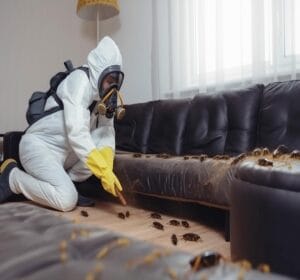
- Professionals have access to more powerful treatments.
- They can identify and seal entry points you might miss.
- A professional can provide a customized prevention plan.
Spotting Signs of Serious Infestation
Keep an eye out for signs that indicate a more serious problem. These include pest droppings, damaged food packaging, and sounds of movement within walls. If you encounter these, it’s time to reach out for professional help.
Choosing the Right Pest Professional
When selecting a pest control service, look for licensed and experienced professionals. Check reviews and ask for recommendations from friends or family. Ensure they use treatments that are safe for your family and pets, and that they offer a guarantee on their work.
FAQ
What are some signs that I have a pest infestation?
You might notice droppings, see the pests themselves, find damaged food packages, or hear unusual noises like scratching in the walls.
If you see any of these signs, it’s time to take action. Start with the prevention tips outlined in this guide, and if the problem persists, consider consulting a termite infestation early signs detection guide for more in-depth information.
Can I use essential oils to deter all types of pests?
Essential oils are effective against many types of pests, but not all. They’re a great first line of defense, but for certain pests like termites, you might need stronger measures.
How often should I inspect my home for potential entry points?
It’s a good idea to inspect your home at the start of each season. As the weather changes, so do the ways pests can enter your home. A regular check can help you catch new vulnerabilities early. For more detailed guidance, consider reading our detection guide & prevention tips.
Are there any natural remedies for termite control?
Natural remedies for termites are limited. While prevention is the best strategy, if you already have an infestation, professional treatment is usually necessary.
When should I definitely call in a professional pest control service?
Call a professional if you have a serious infestation, if you’ve tried DIY methods without success, or if you’re dealing with pests that can cause significant damage, like termites or carpenter ants.
As the seasons change, it’s essential to take proactive steps to prevent pests from making themselves at home in your property. Understanding the early signs of termite infestation and implementing effective prevention tips can save homeowners from costly repairs in the future. Regular inspections, proper yard maintenance, and sealing entry points are just a few methods to keep these unwelcome guests at bay.
